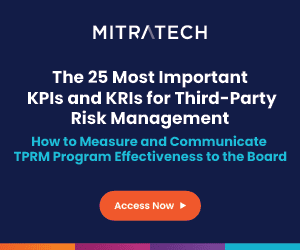Compliance
Burn After Reading? A Better Approach to Securing Shared Information
A burn-after-reading approach to handling data security might be sexy, but it's not terribly practical. And except in very extreme circumstances - say, if you're dealing with international spies - it's altogether unnecessary. There are far more sensible solutions on the market already, and encrypting data, rather than attempting to restrict access to its location, is the key.
No Fear: How Businesses Can Master Content Development on Social Media
Sharing content on social media requires a bit of strategy in order to be most effective. To really engage the audience, your firm should create "snackable" versions of its material, avoid pitching or selling and put a good deal of thought into how information is shared, where it's posted, and when it's pushed out. Joanna Belbey offers excellent guidance on...
More Than Due Diligence: Never-Ending Due Diligence
Conducting due diligence on third parties isn't about diving deep into every possible avenue for wrongdoing. You'd never reach the end, and it is impossible to foretell which agents will engage in corruption. Trying to pinpoint possible red flags must be guided by reasonable inquiries tied to risks. Cover your bases and you'll have covered your bottom as well.
OFAC: Best Practices for P&C Insurers
Commerce is forever becoming more global in nature, and as a result, maintaining compliance with the federal government's regulations is becoming increasingly challenging. For insurers, the issue is especially complex, as they've got to ensure that not only policyholders, but also potential recipients and third-party claimants aren't barred by the OFAC or residing on its SDN list.
Is Social Media/Internet Advertising the Next Monitoring Emphasis for the OIG? Part 2
Companies in the life sciences must actively monitor their promotional and even non-promotional activities to ensure continual compliance with FDA requirements. According to recent OIG enforcement actions, this has come to include all manner of social media activity, from "likes" on Facebook to health claims made online. Are your social media policies clear enough?
Conflict Minerals: Compliance Considerations and Takeaways
Remaining in compliance with the SEC's requirements to disclose use of conflict minerals is an even trickier proposition than it seems. Organizations are liable to be on the receiving end of enforcement actions if any party across their supply chain is in violation of the Conflict Minerals Rules. It's in a company's best interest to step up their auditing and...
Medicare: The Gift That Keeps On Giving
Each Fall, the Centers for Medicare and Medicaid Services releases updates to regulations associated with its Hospital Inpatient Prospective Payment Systems. This year's changes span nearly 600 pages, though many updates pertain to two key topics: reducing hospital readmissions and minimizing hospital reimbursements. Here's what you most need to know.
A Look at What’s Happened in 2014 and What Compliance Challenges Are Still to Come
As has been evidenced by Walmart this year - and the heavy penalties leveled against it - the cost of noncompliance can be steep. With 2014 on the wane, we're looking back at some of the changes that have come about in compliance, as well as the challenges compliance practitioners are facing as a result. Here's what you need to...
A Safe Haven From Which to Plan Foreign Bribes: The Lack of Extra-Territoriality of Hong Kong’s Anti-Bribery Laws
A recent ruling has weakened Hong Kong's anti-corruption and anti-bribery laws, limiting its enforcement power to its borders. The FCPA, UK Bribery Act, and anti-corruption laws of most other Asia-Pac countries stand in contrast to this position, holding perpetrators responsible for corruption wherever they're located.
Privacy and Data Protection: The View from Europe
As is often the case, technology has evolved faster than the law. In the EU, this means that while there is an abundance of solutions available to users, there is also a great need for awareness of applicable regulations and directives. Here we have an in-depth look at recent legislation and the consequences to organizations of non-compliance.
GRC System Design and the Never-Ending Battle Against Ignorance, Incompetence, Unscrupulousness and Malevolence
According to a recent Ernst and Young survey, 67 percent of professionals questioned believe improving the GRC system within their companies should be high priority. There are three key areas to focus on if your firm's governance, risk management and compliance functions need bolstering. Jim Nortz, of Ethics Advisory Services, breaks them down.
Role of a Corporate Compliance Officer
With ever-changing legislation and ever-increasing regulatory scrutiny, the role of the CCO is continually evolving. Corporate compliance officers served once upon a time as compliance cops, but the scope of the role has grown over the last several years so that now CCOs must be champions within their organizations of a culture of compliance and ethics and more...














